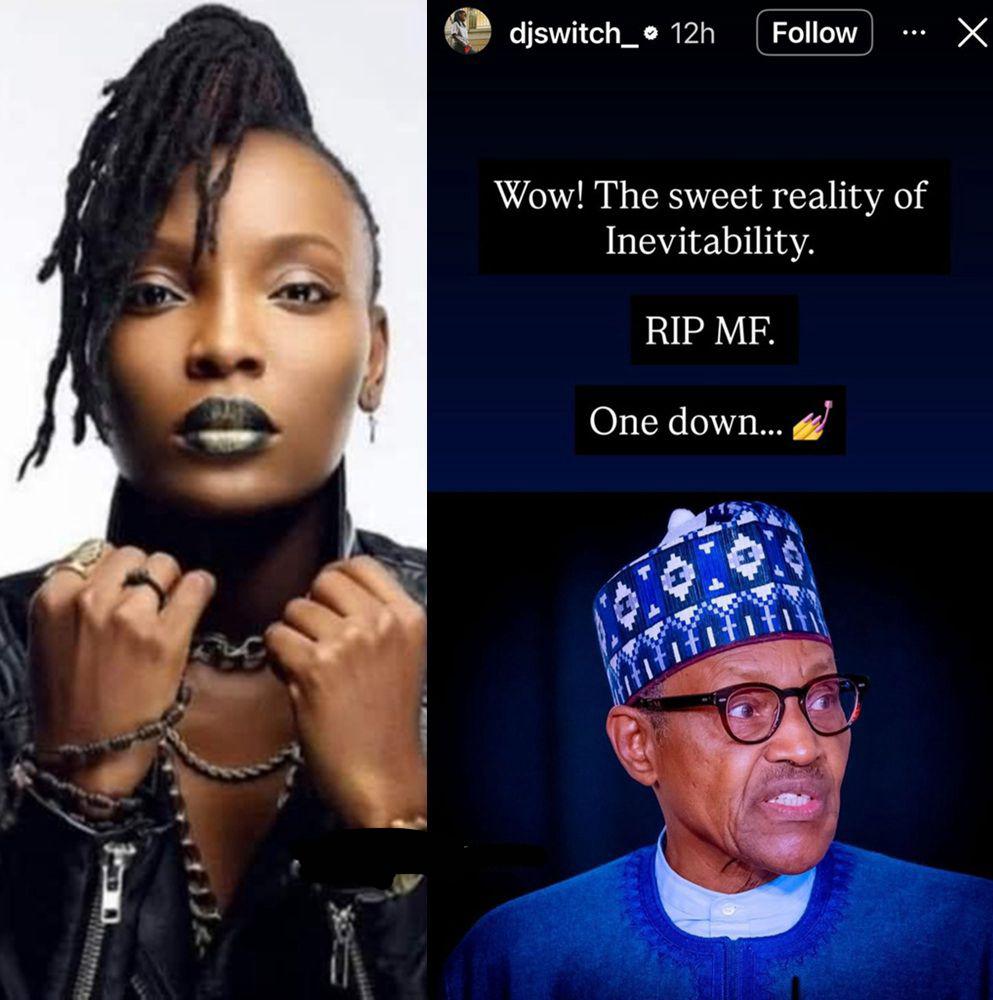
“RIP MF”: DJ Switch Reacts to the Passing of Former President Muhammadu Buhari in Bold Fashion

In a moment that has sent shockwaves across the nation, Nigerian DJ and activist, Obianuju Catherine Udeh, popularly known as DJ Switch, has stirred fresh controversy following her reaction to the death of former President Muhammadu Buhari. The internationally recognized DJ, known for her outspoken role during the #EndSARS protests, took to social media to post a blunt and unapologetic tribute: “RIP MF.” The post, brief but packed with implications, instantly went viral, sparking intense debate, backlash, and support from various corners of the internet.
Former President Muhammadu Buhari, who died in London on Sunday, July 13, 2025, at the age of 82, had long been a polarizing figure in Nigerian political history. Having ruled Nigeria twice—first as a military head of state from 1983 to 1985, and later as a democratically elected president from 2015 to 2023—his legacy is deeply entwined with issues of security, corruption, human rights, and national economic performance. His supporters saw him as a disciplined and incorruptible leader who sought to bring order to Nigeria’s chaotic political landscape. But to critics like DJ Switch and many within the #EndSARS movement, Buhari's administration represented the height of oppression, authoritarianism, and government failure.
DJ Switch’s terse post—"RIP MF"—which many interpreted as “Rest In Peace, Motherf***er,” was met with a flood of reactions. Within minutes of the tweet going live, it racked up tens of thousands of retweets, likes, and quote replies. Some praised her for having the courage to speak the minds of many who suffered under Buhari’s rule. Others accused her of disrespecting the dead and stoking unnecessary division at a time when the country should be mourning a national figure.
The post wasn’t accompanied by any clarification or apology, making it clear that DJ Switch meant every word. To many who followed her journey during the harrowing days of the #EndSARS protests in 2020, her reaction came as no surprise. DJ Switch rose to global attention when she livestreamed the infamous Lekki Toll Gate shooting on October 20, 2020, where peaceful protesters were allegedly shot by military personnel. Her video evidence sparked global outrage and brought international scrutiny on the Nigerian government’s handling of the protests. Following the event, DJ Switch fled Nigeria, claiming threats to her life, and lived in exile for several years.
Buhari’s handling of the #EndSARS protests was one of the most heavily criticized aspects of his administration. Protesters had taken to the streets to demand the disbandment of the Special Anti-Robbery Squad (SARS), a police unit long accused of brutalizing Nigerian youth. Instead of responding with systemic reform, Buhari’s government was accused of violent suppression, misinformation, and attempts to silence key activists like DJ Switch. The official denial of casualties at Lekki Toll Gate and the government’s attempts to downplay the event only added to the anger many Nigerians felt.
For those who lost friends, family, or simply their sense of safety during Buhari’s tenure, DJ Switch’s reaction represented a cathartic release. “She said what many of us are thinking,” one user commented. “You cannot rewrite history just because someone has died,” said another. Many activists joined in solidarity, posting their own responses, some using the same "RIP MF" phrase, while others simply posted black square images or photos from the #EndSARS movement as a quiet form of protest.
Not everyone agreed with her choice of words. Conservative voices and prominent political commentators condemned the post, calling it “disgraceful,” “disrespectful,” and “unbecoming of a public figure.” Some argued that regardless of one’s personal feelings, there are cultural and moral expectations around the treatment of the dead, especially former leaders. "This is a time for reflection, not hatred," a former APC spokesperson tweeted. Religious leaders also weighed in, urging Nigerians to avoid “speaking ill of the dead” and instead pray for the soul of the departed.
Yet, DJ Switch remained silent after the post, refusing to retract, explain, or delete her words. For many, that silence was louder than any statement. In an era where cancel culture is rampant and public figures often backtrack under pressure, DJ Switch stood firm. It’s a move that further cemented her role as one of Nigeria’s most defiant cultural voices—unapologetic, bold, and deeply rooted in her convictions.
The reaction to her post has reignited public debate about Buhari’s legacy. While the former president’s supporters have tried to focus on his achievements in anti-corruption campaigns, infrastructure, and agricultural reforms, his critics have seized this moment to highlight what they call his failures—especially in areas of human rights, economic hardship, and youth suppression. The online discourse has turned into a referendum on his presidency, with some calling for truth and reconciliation, and others justifying DJ Switch’s reaction as emblematic of the pain many Nigerians still feel.
Meanwhile, Buhari’s family has yet to comment on DJ Switch’s post. Official state tributes have poured in from world leaders, African Union officials, and former heads of state, painting Buhari as a “respected African statesman.” But on social media, particularly among Nigerian youth, the atmosphere is far more divided.
DJ Switch’s “RIP MF” may go down as one of the most controversial and unforgettable reactions to a political figure’s death in Nigerian history. It is a reminder that the wounds of #EndSARS, and the broader discontent with the Buhari era, have not healed. It is also a sign that Nigeria’s youth are no longer willing to remain silent or polite in the face of historical trauma. In an age where social media gives everyone a platform, and memories are no longer easily buried, one short post was enough to reopen the conversation—and perhaps keep it alive for years to come.


